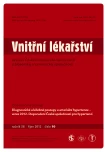-
Medical journals
- Career
Febrile pancytopenia and hepatosplenomegaly as leading symptoms of visceral leishmaniasis
Authors: P. Polák 1; R. Svoboda 1; P. Kubáčková 2; Y. Brychtová 3; A. Panovská 3; E. Nohýnková 4,5; P. Husa 1; M. Freibergerová 1; R. Pařízková 1; M. Šnelerová 1; M. Pýchová 1; J. Kamelander 6
Authors‘ workplace: Klinika infekčních chorob Lékařské fakulty MU a FN Brno, pracoviště Bohunice, přednosta prof. MUDr. Petr Husa, CSc. 1; Oddělení klinické mikrobiologie FN Brno, pracoviště Bohunice, přednostka prim. MUDr. Alena Ševčíková 2; Interní hematologická a onkologická klinika Lékařské fakulty MU a FN Brno, pracoviště Bohunice, přednosta prof. MUDr. Jiří Mayer, CSc. 3; Klinika infekčních, parazitárních a tropických nemocí 1. lékařské fakulty UK a Nemocnice Na Bulovce Praha, přednosta prof. MUDr. Michal Holub, Ph. D. 4; Národní referenční laboratoř pro diagnostiku tropických parazitárních infekcí Praha, vedoucí RNDr. Eva Nohýnková, Ph. D. 5; Oddělení klinické hematologie FN Brno, přednosta prof. MUDr. Miroslav Penka, CSc. 6
Published in: Vnitř Lék 2012; 58(10): 761-764
Category: Case Reports
Overview
The authors present a case report of a patient with febrile pancytopenia, hepatosplenomegaly and weight loss as main symptoms of visceral leishmaniasis. Standard treatment regimen with amphothericin B led to relapse of the disease after several weeks. The definitive cure of the disease was achieved with cytostatic miltefosin (Impavido©), which is not registered in the Czech Republic. The aim of this article is to point out this imported protozoan infection and its basic clinical and laboratory features.
Key words:
visceral leishmaniasis – pancytopenia – hepatosplenomegaly – amphothericin B – miltefosin
Sources
1. Moore EM, Lockwood DN. Leishmaniasis. Clin Med 2011; 11 : 492–497.
2. Marty P, Pomares C, Michel G et al. Mediterranean visceral leishmaniasis. Bull Acad Natl Med 2011; 195 : 181–188.
3. Lahlou H, Filali AB, Alami M et al. Visceral leishmaniasis in 26 HIV-negative adults. BMC Res Notes 2011; 4 : 389.
4. Srividya G, Kulshrestha A, Singh R et al. Diagnosis of visceral leishmaniasis: developments over the last decade. Parasitol Res 2012; 110 : 1065–1078.
5. Korolová E. Leishmanióza jako profesionální tropické onemocnění. Pracov Lék 2010; 62 : 20–24.
6. Lobovská A, Nohýnková E. Nové léky proti parazitárním infekcím. Čas Lék Čes 2003; 142 : 177–181.
7. Evans KJ, Kedzierski L. Development of Vaccines against Visceral Leishmaniasis. J Trop Med 2012; 2012 : 892817.
8. Pitini V, Cascio A, Arrigo C et al. Visceral leishmaniasis after alemtuzumab in a patient with chronic lymphocytic leukaemia. Br J Haematol 2012; 156 : 1.
9. Yanamandra U, Jairam A, Shankar S et al. Visceral leishmaniasis mimicking as second line anti retroviral therapy failure. Intern Med 2011; 50 : 2855–2858.
10. Jawhar NM. Visceral Leishmaniasis with an Unusual Presentation in an HIV Positive Patient. Sultan Qaboos Univ Med J 2011; 11 : 269–272.
11. Varma N, Naseem S. Hematologic changes in visceral leishmaniasis/kala azar. Indian J Hematol Blood Transfus 2010; 26 : 78–82.
Labels
Diabetology Endocrinology Internal medicine
Article was published inInternal Medicine

2012 Issue 10-
All articles in this issue
- Acute myocardial infarction in young adults – what is wrong? – editorial
- Less invasive cardiac surgery approaches to treat ischemic heart disease – editorial
- Visceral leishmaniasis – editorial
- Festina lente! – editorial
- Acute myocardial infarction in young patients – severe failures in the system of acute and secondary care
- Is there a relationship between inflammatory markers, oxidative stress and postoperative atrial fibrillation?
- Sarcoidosis – diagnostics, prognosis and therapy. A retrospective analysis
- Vitamin C and its physiological role with respect to the components of the immune system
- Hypoglycaemia – a phenomenon over which modern diabetology manages to prevail
- AII antagonists (candesartan and irbesartan) in the treatment of cardiovascular diseases
- Febrile pancytopenia and hepatosplenomegaly as leading symptoms of visceral leishmaniasis
- High suspicion of hearth disease gained from taking the case history must not controvert negative results of some medical examination – experience outpatient internist
- Dabigatran etexilate in clinical practice for prevention of thromboembolic events in patients with atrial fibrillation
- Effect of ivabradin on heart rate, left ventricular function a NT-proBNP concentration in patients with systolic chronic heart failure – case reports
- Diagnosis and treatment of arterial hypertension. 2012 Guidelines of the Czech Hypertension Society
- Internal Medicine
- Journal archive
- Current issue
- Online only
- About the journal
Most read in this issue- Vitamin C and its physiological role with respect to the components of the immune system
- Sarcoidosis – diagnostics, prognosis and therapy. A retrospective analysis
- Acute myocardial infarction in young patients – severe failures in the system of acute and secondary care
- Febrile pancytopenia and hepatosplenomegaly as leading symptoms of visceral leishmaniasis
Login#ADS_BOTTOM_SCRIPTS#Forgotten passwordEnter the email address that you registered with. We will send you instructions on how to set a new password.
- Career

